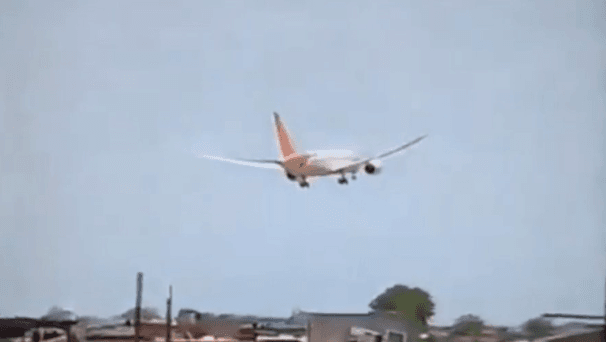In a severe blow to Indian aviation and the global air transport industry, an Air India Boeing 787-8 Dreamliner, registration VT-ANB, crashed shortly after take-off from Ahmedabad (AMD) en route to London Gatwick (LGW). The scheduled flight AI171 was carrying 242 people — 230 passengers and 12 crew — when it disappeared from radar at approximately 625 feet, less than 90 seconds after rotation at 13:38 IST.
The aircraft, India’s first-ever Dreamliner inducted into service in September 2012 as part of Air India’s fleet renewal strategy, impacted a residential building complex in the Meghani Nagar district, igniting extensive fires and triggering an immediate suspension of airport operations. Emergency services remain on site, with ongoing rescue and recovery operations. Early casualty reports suggest significant fatalities, although official numbers are still being verified.
Aviation Milestone — For the Wrong Reasons
This crash marks the first fatal hull-loss involving the Boeing 787 Dreamliner globally since its commercial introduction in 2011. For India, it is the most fatal civil aviation accident since 2020, and a profound shock to an industry that has seen unprecedented growth in both passenger and cargo traffic over the last decade.
The crew, led by Captain Sumeet Sabharwal (8,200 flight hours) and First Officer Clive Kundar (1,100 hours), reportedly issued a Mayday call seconds after take-off, but lost all communications almost immediately thereafter. Weather conditions were reported as stable, focusing preliminary attention on technical failure or procedural issues.
DGCA, Boeing, and OEM Responses
India’s Directorate General of Civil Aviation (DGCA) has formally opened a full-scale investigation, which will include cooperation with Boeing, the FAA, the US National Transportation Safety Board (NTSB), and the Aircraft Accident Investigation Bureau (AAIB) of India. Boeing has issued a statement confirming it is “gathering more information and cooperating fully with authorities.” General Electric, manufacturer of the GEnx engines on the 787, is expected to join the technical probe.
Boeing shares have already seen a sharp decline of over 7% in pre-market trading amid market reaction to the potential implications for the Dreamliner programme.
Cargo Industry: Immediate Capacity Concerns
While primarily a passenger flight, AI171 also carried significant bellyhold cargo — including high-value pharma, perishables and priority e-commerce shipments, sectors in which India has become increasingly active. The loss of one of Air India’s critical wide-body units raises near-term questions for air cargo operators, forwarders and insurers, especially as India’s air freight volumes are projected to surpass 10 million tonnes annually by 2030.
Belly cargo from India-London sectors represents a crucial segment of India’s trade corridors with Europe, and capacity displacement may impact rates, contract renewals, and re-routing strategies in the coming weeks.
Policy and Regulatory Implications
Industry analysts suggest the incident will likely force accelerated reviews across multiple policy dimensions:
- Urban airport zoning and obstacle clearance paths
- Air Traffic Control emergency procedures
- Wide-body ageing fleet inspections and predictive maintenance standards
- ICAO and DGCA black box digital streaming mandates
- Emergency coordination frameworks for India’s rapidly growing aviation hubs
A senior official from the Ministry of Civil Aviation, speaking on condition of anonymity, remarked: “This tragedy will be a defining moment for India’s aviation regulators, carriers, and policymakers. It reinforces the need to balance rapid growth with resilient safety oversight.”
International Coordination Underway
India’s Ministry of External Affairs has confirmed active consular coordination with British, Portuguese, and Canadian authorities, as foreign nationals were among the passengers onboard. Prime Minister Narendra Modi and Home Minister Amit Shah have both issued statements promising full transparency and swift investigation.
Next Steps
Flight data recorders and cockpit voice recorders have not yet been recovered. The DGCA has already ordered preliminary technical checks across Air India’s Dreamliner fleet pending further investigation outcomes.
This tragic event casts a long shadow over India’s ambitions to become a leading global air cargo and passenger hub. As the investigation unfolds, significant regulatory, operational, and trade consequences for the region’s air freight sector are expected in the weeks ahead.
THIS IS A DEVELOPING STORY




